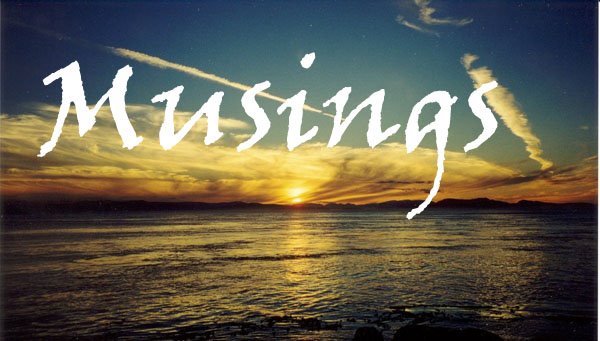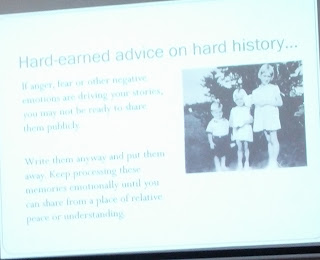On Sundays I take a rest from writing novels, but I still write or at least research for family histories and biographies.
In the past few years when I attend family history/genealogy conferences, I attend the presentations on writing. My expertise on research in finding ancestors is pretty good after all these years and writing is where my interests lie right now. Below are several snapshots I took of presentations. (I'll need to find who the presenters were and cite them.) Many of these ideas are great overlaps for writing novels, especially historical fiction. And, of course, these will be used in the family history class I'm teaching at church. [Aaargh! I'm frustrated that Blogger doesn't give me table options like a website so some of these slides are in weird places.]
1 August 2014


1.Pick one person, event or location
2. Create a story board
3. Make a powerful beginning and end
4. Stay focused
5. Doesn't have to be perfect---just share it.
In writing the biographies of the four grandmothers I'm in the middle of writing, I didn't have a lot of stories about them, especially my Welsh grandmother, Mary Rees, so had to glean stories from documents and bring in historical facts and events. In writing the historical novel, I used names and events from census records and other documents I came across, especially the Kirk Sessions. In fact, it was through these sessions that a plot evolved.
Not only do characters in a story evolve and change, but we do too. I like the idea of being a character in my own life, it not only gives a new perspective on events, but also helps me see patterns and decisions that changed my life in so many different ways. Last year the focus at RootsTech seemed to be on writing stories that help families, especially children become more resilient. Research shows that if children know their family histories, they are better able to deal with hard things they are going through. One of the main speakers at the event was Bruce Feiler who wrote an article in the NYT: "The Family Stories that Bind Us."
This is a hard one. How much do you reveal in a autobiography or biography. I know the trend is to "tell it all, warts and all" but is that productive in the end? For example, I've heard a few stories about our grandmother from my cousin, Jane, and there's one story that I'm trying to decide whether to include in the biography or not. A lot of the stuff I have about her is sort of negative already: she was a difficult person, and to be fair, it seems like it's the negative things that are remembered. "The good is oft interred with the bones" said Marc Anthony in the play, Julius Caesar. So do I add the story that as soon as Grandpa died, she threw his pipe and smashed it saying "Well, that's him gone"? And yet, by other accounts she loved him deeply. It's about changing. She was a different person at age 74: bedridden, bitter, confined, lonely, except for her unmarried daughter, Elsie. Unconsciously, I included her as a character in my historical novel, not so much with the interaction with the protagonist, but the idea of a bitter, sickly old woman with a mean tongue. Perhaps in telling hard things it makes a difference how you frame it.
But this slide, also is very hopeful in that if there are hard things in your life writing them down helps somehow to diffuse the terrible memories, even if you never share them and destroy them; you never get to that safe place. It is a technique used in psychology: write down your resentments against a person making them concrete, not vague. Read them aloud, one by one, and then destroy them one by one by shredding or setting on fire. I tried it when I was having continual years-past issues with my mother. It is cathartic, empowering, and helps you love that person better without that barrier of self-preservation. You feel safe.





No comments:
Post a Comment